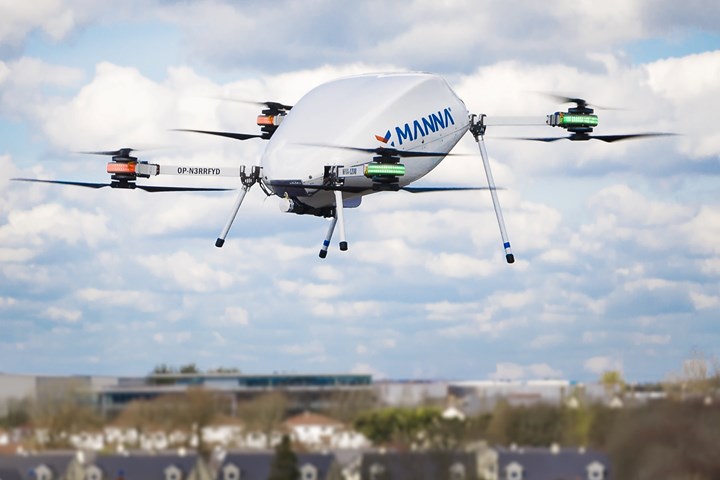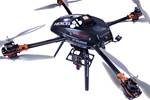ÉireComposites, Manna and NUIG to develop carbon fiber composite drone airframe
The aim to develop additive manufacturing and automation technologies for high-volume manufacturing of drones for 36% reduction in cost per drone.

The MI-DRONE project will begin immediately with full-scale operational testing to begin at the start of 2023. Photo credit: Manna, ÉireComposite, NUI
ÉireComposites (Inverin, Galway, Ireland), an innovative design, manufacturing and testing company, has announced a partnership with Manna Galway to design and develop an aerospace-grade carbon fiber-reinforced composite airframe for the drone-based food delivery service provider Manna (Dublin, Ireland). Alongside National University of Ireland Galway (NUIG), the two companies also received €2.44 million for the MI-DRONE project. The funding comes from the Department of Enterprise, Trade and Employment under its latest round of the Disruptive Technologies Innovation Fund (DTIF).
The MI-DRONE project helps to address consumer demand for fast, reliable, last-mile delivery using a drone with delivery times being reduced to three minutes. The project also reportedly addresses sustainability with emissions decreasing by 80% as a direct result of drones replacing approximately 2,800 cars/vans on Irish roads.
ÉireComposites’ role within the venture is to coordinate the project and lead lightweighting of the airframe through the development of structural components from carbon fiber. Working alongside NUIG, ÉireComposites says it will develop additive manufacturing (AM) and automation technologies for high-volume manufacturing of drones, and for structural testing of the same. It is envisioned that this manufacturing will lead to a reduction of the cost per drone by 36% between 2024 and 2026.
In order to effectively scale the business, the production of a large number of aircraft over a short time period is essential, ÉireComposites notes. Therefore, a range of advanced manufacturing processes, which includes automated manufacturing, such as automated tape placement (ATP), pre-programmed kitting of plies and induction welding, will be developed to allow for high-volume production of the drone airframe.
According to ÉireComposites, the results of the project will lead to a significant reduction in delivery charges for customers. Beyond Ireland, the consortium believes that the MI-DRONE project can expand globally to serve one billion people with last-mile delivery and displace 560,000 cars and vans with drones.
The MI-DRONE project will begin immediately with full-scale operational testing to begin at the start of 2023.
“We are delighted with the announcement that the MI-DRONE project is to receive substantial funding to help make this idea become a reality,” says Tomás Flanagan, ÉireComposites CEO. “We are excited to be playing a leading role in the improvement of drone technology. The goal of this project is to fast forward the evolution of drone delivery and we believe this consortium brings with it the best in terms of leadership, vision and manufacturing to make this a reality and to align Ireland as a world leader in both drone delivery technology and manufacturing.”
Related Content
-
Infinite Composites: Type V tanks for space, hydrogen, automotive and more
After a decade of proving its linerless, weight-saving composite tanks with NASA and more than 30 aerospace companies, this CryoSphere pioneer is scaling for growth in commercial space and sustainable transportation on Earth.
-
The potential for thermoplastic composite nacelles
Collins Aerospace draws on global team, decades of experience to demonstrate large, curved AFP and welded structures for the next generation of aircraft.
-
3D-printed CFRP tools for serial production of composite landing flaps
GKN Aerospace Munich and CEAD develop printed tooling with short and continuous fiber that reduces cost and increases sustainability for composites production.













.jpg;maxWidth=300;quality=90)


